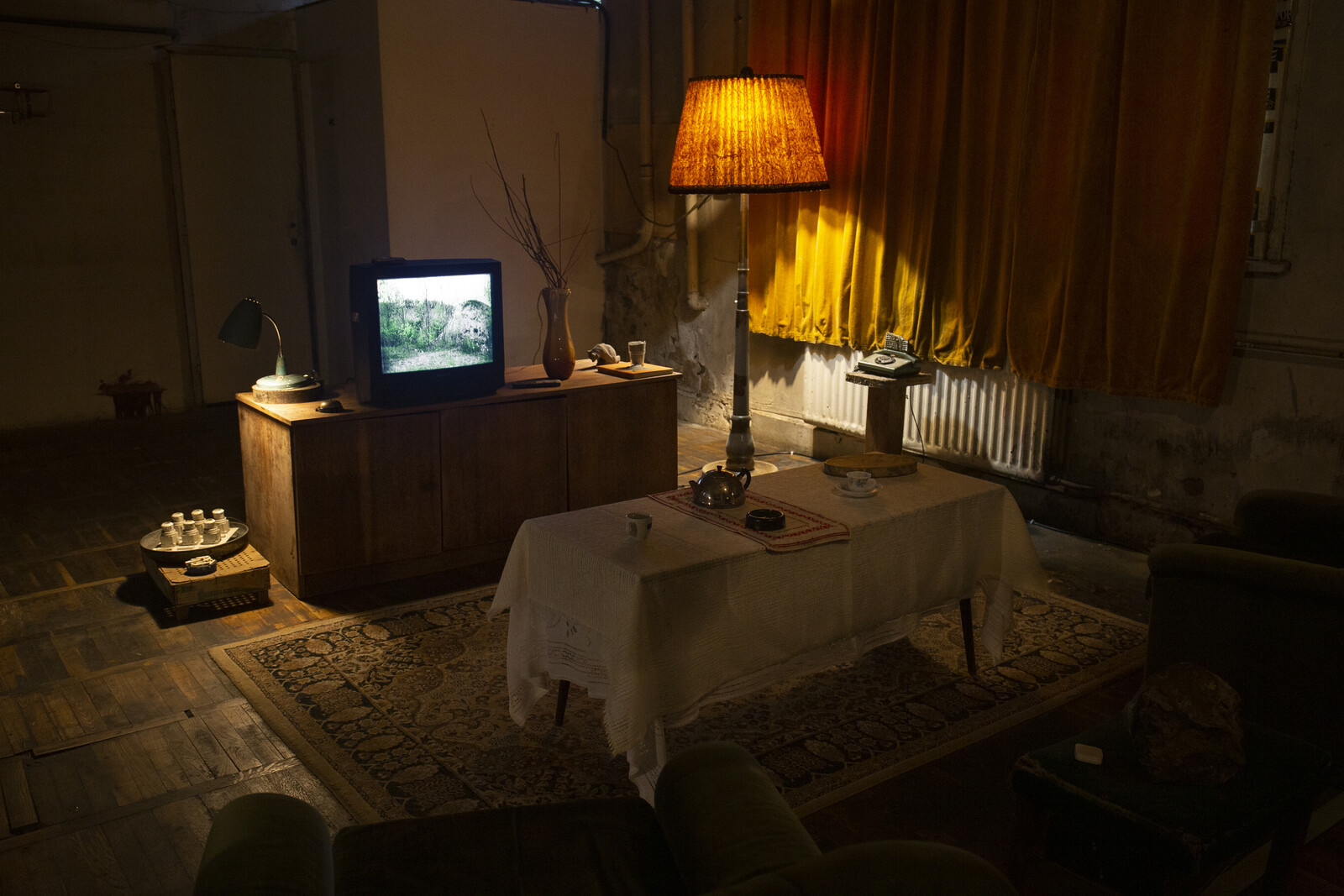The Neighbours
April 20–November 24, 2024
The Bulgarian pavilion at the 60th International Venice Biennale explores the silenced memories of survivors of state violence from 1945 to 1989 in an evocative multimedia installation titled The Neighbours.
Curated by Vasil Vladimirov and featuring artists Krasimira Butseva, Lilia Topouzova, and Julian Chehirian, the installation employs found objects, video, and sound to convey the stories of individuals subjected to persecution in forced labour camps and prisons. The multidisciplinary project is rooted in extensive scholarly research and over forty interviews conducted by the practitioners. It focuses on the intricacies of how individuals remember and articulate their experiences in the aftermath of traumatic events based on Lilia Topouzova’s theoretical framework.
“The exhibition stages untold stories by a series of ‘domestic foreigners’ who faced persecution, imprisonment without trial, and endured forced labour camps for reasons ranging from political beliefs to appearance. It documents the systematic persecution that affected political dissidents, many of them on the left, peasants who wanted to hold on to their land, artists, queer people, Turkish, Roma, and Muslim minorities, and countless ordinary people who deviated from the regime’s narrow ideals. The project not only serves as a poignant memorial for the victims but also offers a critical reflection on the oppressive political climate of the past and the current institutional hesitancy to confront its legacy.” —Vasil Vladimirov.
The installation acts as a form of inquiry, inviting audiences to enter, sit, and bear witness to survivors’ trauma but also to their resilience and refusal to be written out of the historical record. The installation not only encapsulates fragments of domestic spaces—mirroring the survivors’ homes—but also employs video projections, sound and automated technology to evoke presence. Scattered items recovered from the camp sites such as stones and water visually connect the material world of the camps to domestic spaces, illustrating how traumatic memory permeates everyday life.
The Neighbours enacts a space of care and collective healing, utilising the language of absence to nurture remembrance as an act of resistance against oblivion. It brings the Bulgarian narrative into global conversations on truth, reconciliation, and collective memory and emphasises art’s vital role in engaging with complex realities and fostering reflection.
The project was selected as a result of a competition organised by the Bulgarian Ministry of Culture. In 2024, Bulgaria will register its eleventh national participation (the first was in 1910, followed by 1942, 1948, 1964, 1993, 1999, 2007, 2011, 2019, and 2022).
Vasil Vladimirov is a curator based in Sofia and his practice lies at the intersection between art, politics, and history. He is the curator and director of KO-OP Art Space and the founder of FIG – The Festival for Illustration and Graphics. His extensive involvement in the art scene includes guest curator positions at prominent local and international festivals and gallery programmes. He is a fellow of the Centre for Social Vision in Sofia, developing a research project and LARP workshop connected to communist-era cultural heritage. He holds a BA in Modern History and Politics from the Royal Holloway, University of London and an MA in Political Sociology from the London School of Economics and Political Science.
Krasimira Butseva is a visual artist and researcher based in Sofia and London. She is a Senior Lecturer at the London College of Communication, University of the Arts London. In her creative and academic practice, Butseva works with trauma, memory, political violence, official and unofficial history, whilst employing video, sound, photography and installation as mediums. She has taken part in solo and group exhibitions in London, Brighton, Ipswich, Portsmouth, Gosport, Pingyao, Sofia, Plovdiv, Lovech, Cape Town, Kyiv, Belgrade, Berlin, and Stuttgart.
Dr. Lilia Topouzova is an Assistant Professor of History and Creative Nonfiction at the University of Toronto. She is a scholar and a documentary filmmaker whose work is situated at the intersection of history and memory. Her writing has appeared in the American Historical Review, Gender & History, The Routledge Handbook of Memory and Place, the Encyclopedia of Transitional Justice, the Journal of Visual Literacy and The European Review of Books. Topouzova was the scriptwriter of the documentary films The Mosquito Problem & Other Stories (2007) and Saturnia (2012), which she also co-directed.
Julian Chehirian is a multimedia artist and researcher living between Philadelphia and Sofia. He is currently a PhD candidate in the History of Science at Princeton University, USA. Julian creates site-specific multimedia installations that employ modified objects, video, sound, and experimental technologies. In his scholarship, he writes on the history of attention and psychotherapy, post-war art and transnational history. His writing has appeared in edited collections for Yale University Press, Columbia University Press, Bloomsbury, in Culture, Medicine and Psychiatry, and in The Public Domain Review.
Commissioner Dr. Nadezhda Dzhakova is the Director of the Sofia Arsenal – Museum of Contemporary Art, a department of the National Gallery, Bulgaria. She is an art historian, curator and critic whose research focuses on contemporary art practices, contemporary painting and photography, and site-specific art. She has lectured on contemporary art in Bulgaria, Germany, Great Britain, Russia and China, and is a guest lecturer at the University of Architecture, Civil Engineering and Geodesy and New Bulgarian University in Sofia. Dzhakova is a member of the International Association of Art Critics (AICA).
A media and professionals preview is scheduled for Friday, April 19, from 5–7pm.
Media enquiries: Nicola Jeffs, nj [at] nicolajeffs.com / T +44 (0) 7794 694 754

